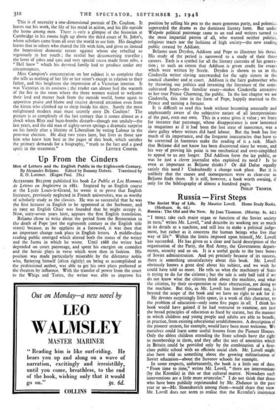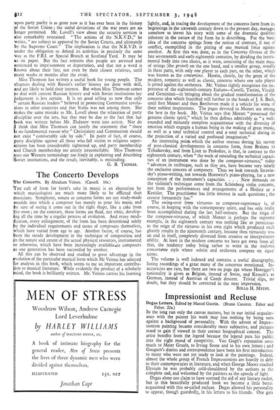Russia — First Steps
The Soviet Way of Life. By Maurice Lovell. Home Study Books. (Methuen. 4s. 6d.) Russia: The Old and the New. By Joan Thomson. (Murray. 8s. 6d.)
"I SHALL take each major organ or function of the Soviet society in turn," writes Mr. Lovell, "and describe its working not so much in its details as a machine, and still less to make -a political judge- ment, but rather as it concerns the human beings who live that way of life." Within the limits imposed upon himself, Mr. Lovell has succeeded. He has given us a clear and 'lucid description of the organisation of the Party, the Red Army, the Government depart- ments, security and so on. It is a useful guide to the bare bones of Soviet administration. And yet precisely because of its success, there is something unsatisfactory about this book. Mr. Lovell obviously knows a great deal about his subject, and we wish he could have told us more. He tells us what the machinery of State is trying to do for the citizens ; but the tale is only half told if we do not know what the citizens think about the machine, and what the citizens, by their co-operation or their obstruction, are doing to the machine. But this as Mr. Lovell has himself pointed out, is beyond the scope of the book and we have no right to ask for it.
He devotes surprisingly little space, in a work of this character, to the problem of education—only some five pages in all. I think his book would have gained if he had ventured to examine, not just the broad principles of education as fixed by statute, but the manner in which children and young people and adults are able to benefit, in practice, from existing educational establishments. A description of the pioneer system, for example would have been most welcome. We ourselves could learn some useful lessons from the Pioneer Houses. Only the ablest children attending the State schools have the right to membership in them, and they offer the sort of amenities which in Britain Could be provided only by the combination of a first- class public school with an efficient social club. Mr. Lovell might also have told us something about the growing militarisation of Soviet education—about. the Suvorov schools for example.
In some respects, unfortunately, the book is a little out of date. "From time to time," writes Mr. Lovell, "there are interventions (by the Kremlin) in this or that cultural matter. Nowadays such interventions are a little more avuncular." I do not think that those who have been publicly reprimanded by Mr. Zhdanov in the past year or so—Mr. Shostakovich among them—would share that view. Mr. Lovell does not seem to realise that the Kremlin's insistence ,upon party purity is as great now as it has ever been in the history 'of the Soviet Union; the sinful deviations of the war years are no tonger permitted. Mr. Lovell's view about the security services is also remarkably restrained. "The actions of the N.K.V.D.," he writes, "are subject to approval by the Soviet Courts, and ultimately by the Supreme Court." The implication is that the N.K.V.D. is under the obligation to defend its activities in precisely the same way as the F.B.I. or Special Branch at Scotland Yard. It may be so on paper. But the fact remains that people are arrested and sentenced to imprisonment or deportation, and that not a word is known about their fate, not even by their closest relatives, until many weeks or months after the event.
Miss Thomson hai written a useful book for young people. The chapters dealing with Russia's earlier history are done with skill, and are likely to hold their interest. But when. Miss Thomson comes Fo deal with current Russian history and with Soviet institutions her judgement is less certain. It is no good telling us now that only `` certain Russian leaders" believed in promoting Communist revolu- tions in other countries and that Stalin was not among them. She 'makes the same mistake as Mr. Lovell about the relaxation of party discipline over the arts, but that may be due to the fact that her rnk was written before Mr. Zhdanov went into action. Nor do think that Miss Thomson can justify the statement that " there o fundamental reason why" Christianity and Communism should cot exist "comfortably side by side." In point of fact, of course, party discipline against all those who f all victim to religious super- stitions has been considerably tightened up, and party membership and Church membership are utterly irreconcilable. Miss Thomson fuses our Western terminology too freely in explaining and describing .Soviet institutions, and the result, inevitably, is misleading.
G. B. THOMAS.



































 Previous page
Previous page